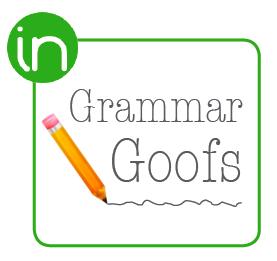Insurance Marketing Grammar Goofs — Three Mistakes to Avoid

In the insurance marketing world, professionalism is essential. No one wants a simple typo or grammar mistake to get in the way of winning customers. Though spelling programs can catch many errors, they can't replace good grammar. So, to help you become a better insurance copywriter, we’re introducing this new “Grammar Goofs” column. Every month, we’ll showcase three common mistakes and how to correct them.
January Grammar Goof Focus Areas:
1. Repeated redundancies: Brevity is vital in insurance marketing. You want to get to the point as quickly as possible, make your pitch, and then close. Redundant language not only adds length to whatever you are writing, it also bogs readers down. Redundancy occurs when you use two words or phrases together that mean the same thing. Here are few common examples:
- Incorrect: Let's meet at 12 p.m. noon for the phone conference.
- Correct: Let's meet at noon for the phone conference. (12 p.m. and noon are the same. Pick one — 12 p.m. or noon.)
- Incorrect: What is your PIN number?
- Correct: What is your PIN? (PIN stands for "personal identification number," so what you are really writing is: What is your personal identification number number?)
2. Mixing a singular noun and with a plural pronoun: Don't take the easy way out. “They” is not a singular pronoun. To avoid appearing sexist, many insurance marketing pieces incorrectly use "they" as a singular gender-neutral pronoun instead of committing to using "he," "she," or even "it."
- Incorrect: When a customer is shopping for insurance, they often don't know what kind of coverage they need.
- Better: When a customer is shopping for insurance, he often doesn't know what kind of coverage he needs.
- Best: When customers are shopping for insurance, they often don't know what kind of coverage they need. To avoid picking one gender and using it throughout a piece, or flip-flopping between "he" and "she" and potentially causing reader confusion, rewrite the sentence, or even the entire paragraph if needed, in the plural.
3. Using the word 'over' incorrectly: The misuse of "over" is one of the most common grammar mistakes. It is often used for numbers, time and space. And, since it is only one word compared to the two of "more than," it is shorter and easier to use. However, that does not make it correct. "Over" refers to spatial relationships and "more than" refers to numbers. Think of "over" as more of an action word (jumping over a log) or time (over the years), and think of "more than" as a figure (more than $100,000.)
-
Example: The marketing insurance agent jumped over many obstacles to gain more than 100 new clients last year.
Remember, good grammar leads to greater professionalism and more sales! Stay tuned every month for more grammar tips to help you “goof-proof” your insurance marketing!
